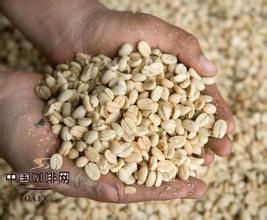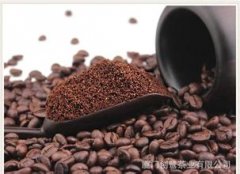A brief introduction to the planting Market Price of Cupid Fine Coffee Bean varieties in Panama

In 1996, Blaise and Rachel visited a farm for sale in the Haramijun area of the Bocketi Valley, and was attracted by the beautiful farm and immediately bought it. This is Esmeralda. Daniel Lou, the third son of Haramiqiong Farm. It is in this farm that Mr Bidazon has grown the coffee world's eye-catching coffee-Geisha coffee Panama Poket butterfly coffee bean Panama Boquete Butterfly, which is said to contain 40% of Deep-Fried Chicken coffee variety-geisha Rosa (geisha) coffee beans, which are more expensive than Blue Mountain Coffee.
Gesha is one of the most primitive coffee varieties in the world. Some people call it "geisha" and some people translate it as "Rose Summer". Her name contains tenderness and floral fragrance. It is an unforgettable coffee. It is also the winner of national bidding and cup testing competitions, and has been highly praised. Good geisha coffee will have strong floral and citrus aromas, bright and elegant acidity, soft and clear taste, and extremely meticulous finish!
Boquete is a high-altitude volcanic area, because the Baru Volcano volcano brings quite fertile soil, towering terrain, cold and humid air, different sunshine, abundant rainfall, and rivers flow through it, creating high-quality Panamanian boutique coffee. This batch of coffee, grown in the same area as the Jade Manor, happens to be located in continuous valleys and ridges, so it forms several microclimates, and the coffee produced in different regions has its own flavor. Refreshing and comfortable citrus feeling, bright pattern-like Nanyang fruit feeling, slender flower fragrance crisscross exudes a very elegant and generous flavor
In 2007, the International famous Bean Cup Test sponsored by the American Fine Coffee Association (SCAA) won the championship again, and the bidding price was sold at US $130 per pound, setting a record for the highest price in the history of competition beans. It is reported that the later Panamanian national treasure bean competition will be divided into two groups: Rose Summer and non-Rose Summer, so as not to be robbed of the brilliance of other varieties by Rose Summer. Rosa is a member of the Tibika family, but it became famous more than 70 years after leaving Ethiopia, and fulfilled the saying that Ethiopia is a treasure trove of Arabica genes. Giving a variety to go abroad is enough to stir up trouble in the coffee market.
Boquete is a high-altitude volcanic area, because the Baru Volcano volcano brings quite fertile soil, towering terrain, cold and humid air, different sunshine, abundant rainfall, and rivers flow through it, creating high-quality Panamanian boutique coffee. This batch of coffee, grown in the same area as the Jade Manor, happens to be located in continuous valleys and ridges, so it forms several microclimates, and the coffee produced in different regions has its own flavor. Refreshing and comfortable citrus feeling, bright pattern-like Nanyang fruit feeling, slender flower fragrance crisscross exudes a very elegant and generous flavor
Species of Geisha were discovered in the Rose Summer Forest of Ethiopia in 1931 and sent to the Coffee Research Institute in Kenya, introduced to Uganda and Tanzania in 1936, introduced to Costa Rica in 1953, and Panama was introduced in the 1970s by Mr. Francis Coselazin of the Tonba Seven Farm Garden from CATIE in Costa Rica and began to grow Rose Summer Coffee.
Geisha, sweeping the coffee world with the power of a hurricane, the coffee revolution is so fierce that the blue mountains of Jamaica and Kona of Hawaii, which have long occupied the throne of the coffee kingdom, have to stay away. This wild species, which originated in Ethiopia, is now widely used in major coffee producing areas after numerous battles, and its best spokesman is the "LaEsmeralda" estate from Panama.
History of Esmeralda Farm: founded by Hans Elliot, a Swede, in 1924, Esmeralda Farm was not a coffee grower but a ranch. Forty years later, in 1964, Mr. Danielupidason's grandfather, Ruth Lover. Mr. Bidasson bought Esmeralda Farm in order to have an old home after retirement. His grandfather, Mr. Ruth Lover Bidasson, was born in Sweden and was president of the Bank of America and director of United Nations development. His son, Mr. Brais Bidarsson, moved to Panama from California in 1973 and inherited to run his father's farm. In 1987, most of the farms were changed to grow coffee. In 1994, he invested in the machinery and equipment of refined coffee in order to create a brand. Mr. Brais Bidarson and his wife Susan also raised three children, Elligu (born in Philadelphia in 1966). Rachel (born in Sweden in 1967), Danielu (born in Panama in 1974)
Species of Geisha were discovered in the Rose Summer Forest of Ethiopia in 1931 and sent to the Coffee Research Institute in Kenya, introduced to Uganda and Tanzania in 1936, introduced to Costa Rica in 1953, and Panama was introduced in the 1970s by Mr. Francis Coselazin of the Tonba Seven Farm Garden from CATIE in Costa Rica and began to grow Rose Summer Coffee.
Geisha, sweeping the coffee world with the power of a hurricane, the coffee revolution is so fierce that the blue mountains of Jamaica and Kona of Hawaii, which have long occupied the throne of the coffee kingdom, have to stay away. This wild species, which originated in Ethiopia, is now widely used in major coffee producing areas after numerous battles, and its best spokesman is the "LaEsmeralda" estate from Panama.
History of Esmeralda Farm: founded by Hans Elliot, a Swede, in 1924, Esmeralda Farm was not a coffee grower but a ranch. Forty years later, in 1964, Mr. Danielupidason's grandfather, Ruth Lover. Mr. Bidasson bought Esmeralda Farm in order to have an old home after retirement. His grandfather, Mr. Ruth Lover Bidasson, was born in Sweden and was president of the Bank of America and director of United Nations development. His son, Mr. Brais Bidarsson, moved to Panama from California in 1973 and inherited to run his father's farm. In 1987, most of the farms were changed to grow coffee. In 1994, he invested in the machinery and equipment of refined coffee in order to create a brand. Mr. Brais Bidarson and his wife Susan also raised three children, Elligu (born in Philadelphia in 1966). Rachel Lou (born in Sweden in 1967) and Danielu (born in Panama in 1974).
Important Notice :
前街咖啡 FrontStreet Coffee has moved to new addredd:
FrontStreet Coffee Address: 315,Donghua East Road,GuangZhou
Tel:020 38364473
- Prev

A brief introduction to the history and culture of the origin and development of Panamanian boutique coffee beans Cupid coffee
Farmers harvest complete coffee berries by hand and send them to nearby CafedeEletaS.A. For post-processing, the treatment plant is about 4 kilometers away from the farm, and a modern laboratory is set up for cup testing tube and manual screening.
- Next

A brief introduction to the planting situation of Panamanian Cupid Coffee full of Flowers, location, Climate and altitude
In fact, Panamanian coffee has not received due recognition and attention in the boutique coffee market. Good Panamanian coffee has always been used by unscrupulous businessmen to imitate Hawaiian kona coffee and even Jamaican Blue Mountain coffee. Panamanian coffee generally belongs to the low and medium price, but its performance in the cup is often not inferior to that of any famous or even expensive famous coffee.
Related
- Detailed explanation of Jadeite planting Land in Panamanian Jadeite Manor introduction to the grading system of Jadeite competitive bidding, Red bid, Green bid and Rose Summer
- Story of Coffee planting in Brenka region of Costa Rica Stonehenge Manor anaerobic heavy honey treatment of flavor mouth
- What's on the barrel of Blue Mountain Coffee beans?
- Can American coffee also pull flowers? How to use hot American style to pull out a good-looking pattern?
- Can you make a cold extract with coffee beans? What is the right proportion for cold-extracted coffee formula?
- Indonesian PWN Gold Mandrine Coffee Origin Features Flavor How to Chong? Mandolin coffee is American.
- A brief introduction to the flavor characteristics of Brazilian yellow bourbon coffee beans
- What is the effect of different water quality on the flavor of cold-extracted coffee? What kind of water is best for brewing coffee?
- Why do you think of Rose Summer whenever you mention Panamanian coffee?
- Introduction to the characteristics of authentic blue mountain coffee bean producing areas? What is the CIB Coffee Authority in Jamaica?

